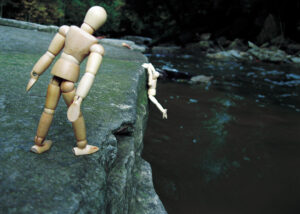Pride goeth before a fall, I ruefully thought last month, as I limped away from the place where I had taken a nasty tumble.
I fell in the Detroit airport just before stepping onto the huge, four-storey escalator. Just after glancing at a slow-moving couple a decade or two older than me, who appeared to be heading to the elevator, and smugly thinking—I confess with embarrassment—“I am fit. I don’t need the elevator.”
Then kaboom, the tip of my sandal caught the floor and I pitched forward, falling hard on my left shin, so hard that I couldn’t readily stand and needed help to regain my balance. Help I received from that same older couple and a cleaning person, who insisted that I take the elevator. Chastened and stunned with pain, I complied. Yes, sometimes pride goes before a fall, literally.
Fortunately, the pain was short-lived and the injury didn’t interfere with my normal activity. I was heading to my mother’s that day. When I arrived and told her of the incident, she sympathized and then cheerfully offered, “I’ve got a knee brace if you need it, or a cane, or a walker.” My mother has experienced some mobility challenges, and her good humour reflected the humility that she has wisely cultivated.
Humility is the antidote to pride:
- Pride says I am better than others. Humility says I respect others’ qualities.
- Pride says I am the source of my accomplishments. Humility says I have been blessed with gifts that I use for the good of the community.
- Pride says I am self-sufficient. Humility recognizes the web of life-giving connections, of which I am a small part.
Pride is such a natural human tendency, and so deadly. “Pride is the first sin, the source of all other sins, and the worst sin,” said theologian Thomas Aquinas. Like other sins, pride draws us into ourselves and blinds us to the needs of others, and to our place of interdependency in the community. Humility opens us up to remembering God as the source of all gifts. Humility frees us to claim our rightful place in God’s world, as beneficiaries of God’s gifts, to use in service to God’s purposes.
The Bible has quite a bit to say about pride. The oft-quoted phrase I recalled after my tumble is found in Proverbs 16:18. Jesus’ parables often touched on pride, including the one about the proud Pharisee and the humble sinner in Luke 18. And Paul reminds us that love is not boastful in I Corinthians 13:4.
Of course, there are variations on pride and humility. We might recall examples of false pride and false humility. Some of us may be guilty of a kind of pride by hiding our gifts and refusing to take risks. We may couch it in humble terms, but really it’s borne out of misplaced fear, even pride. “I’m not showy, like Martha,” we might think. Or, “I’m not one to toot my own horn, like Ben does.”
I wonder about the stories of Esther and Mary in the Bible. Could Esther have thwarted the plot to kill her people if she had denied the power she possessed? Could Mary have birthed and nurtured Jesus if she had refused to use her physical and spiritual gifts? Or Jesus: Could he have accomplished what he did without a keen sense of his own abilities, and the courage to use them?
Paul’s advice to the Galatians (6:4-5) is worth pondering: “Make a careful exploration of who you are and the work you have been given, and then sink yourself into that. Don’t be impressed with yourself. Don’t compare yourself with others. Each of you must take responsibility for doing the creative best you can with your own life” (The Message).
Melissa Miller (familyties@mymts.net) lives in Winnipeg. She is wrapped in the family ties of daughter, sister, wife, mother, friend and pastor.
See Melissa’s other columns in her series on the deadly sins:
The deadly sin of gluttony
The deadly sin of sloth
The deadly sin of wrath
The deadly sin of lust
The deadly sin of envy
The deadly sin of greed
Talk of sin should start with forgiveness







Leave a Reply
You must be logged in to post a comment.